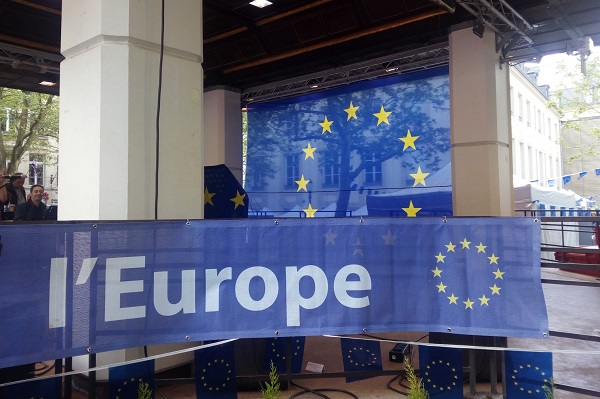 Europe Day 2017 in Luxembourg City;
Credit: Jazmin Campbell, Chronicle.lu
Europe Day 2017 in Luxembourg City;
Credit: Jazmin Campbell, Chronicle.lu
On Wednesday 10 September 2025, European Commission President Ursula von der Leyen delivered her annual State of the Union address to the European Parliament in Strasbourg, setting out the EU's main priorities for the year ahead.
Her speech emphasised Europe's need for resilience, unity and assertiveness in a rapidly changing world. Among the key proposals were:
- Competitiveness: Single Market Roadmap to 2028; Industrial Accelerator Act; Omnibus packages; 28th Regime and European Innovation Act; European Grids Package; EU Cloud and AI Development Act
- Defence and Security: Eastern Flank Watch initiative; Roadmap for European Defence Readiness and European Defence Semester; Amendment of the European Border and Coast Guard Regulation; New rules on fighting organised crime and new sanctions regime for targeting smugglers and traffickers; Revision of the Europol Regulation
- European social fairness: Strategy for Outermost Regions and Agenda for Cities; Skills portability initiative; Affordable Housing Plan; European Anti-Poverty Strategy; Quality Jobs Act; Gender Equality Strategy
- Quality of life: European Climate Adaptation Plan; Initiative on the Generational Renewal of Farming; Livestock strategy including elements on animal welfare; Omnibus package on food; Ocean Act
- Democracy and values: European democracy shield; Digital Fairness Act; Media Resilience Programme; Anti-corruption strategy; Action plan against cyberbullying
- Global Europe: Humanitarian Communication; Pact for the Mediterranean; EU-India Strategic Agenda.
A major announcement was the decision to halt bilateral support to Israel, sanction certain “extremist ministers” and “violent settlers” and partially suspend the EU’s Association Agreement with Israel on trade.
Luxembourg MEPs’ reactions
At a virtual press conference on Wednesday afternoon, Luxembourg’s six MEPs shared their reactions to Ursula von der Leyen’s speech, which also tried to rally the centre and left-leaning political groups constituting her majority in the European Parliament.
Isabel Wiseler-Lima (EPP, CSV) agreed with the Commission President that Europe must be strong at what is “an extremely crucial moment for our independence and for our security”. She praised Ms von der Leyen's “kämpferisch” (combative/determined) tone and reiterated the need for unity and a strong pro-European political centre in a changing world where Europe must fight for freedom, independence, peace and democracy. She highlighted that support for Ukraine was linked to Europe’s own freedom, pointing to the recent incident of Russian drones over Poland as proof of the real threat posed by Russia.
Marc Angel (S&D, LSAP) felt that President von der Leyen was finally showing much-needed strength, at a time when people were questioning the EU’s role. He agreed that pro-European democratic partners must work together to move forward and “we need more Europe”, although he criticised polarising remarks made by EPP leader Manfred Weber (Germany) toward S&D head Iratxe Garciá Pérez (Spain). Mr Angel welcomed social measures such as the anti-poverty strategy and affordable housing plan, noting his group had pushed for these. However, concrete actions are still required, for example on affordable energy. He criticised the EU’s stance on Gaza as insufficient, hinting that Europe was losing credibility due to double standards - it remains important to support Ukraine but cannot have other standards for Israel/Gaza. He argued that a partial suspension of the association agreement and limited sanctions did not go far enough, as it is “not half a genocide, but a total genocide” - although the Commission proposal is “a good first step at least”.
Charles Goerens (Renew, DP) described Ursula von der Leyen as “very determined” in her speech, although he found the part about US trade and tariffs slightly weaker. He supported measures to make Europe more independent and sovereign, also agreeing on the need to work together and find compromises within the institutions. He too criticised the EPP-S&D spat, calling attacks on partners “counterproductive”.
Tilly Metz (The Greens, Déi Gréng) called the Commission President's speech “rhetorically strong” but light on concrete measures. She warned that climate action, social cohesion and social justice were treated as secondary to defence and competitiveness. “Yes, Europe is responsible for its own security, but it is also above all responsible for citizens in the EU and their future,” she said. “Our world is burning.” On Gaza, she lamented that it had taken thousands of deaths for the EU to toughen its stance; she agreed with Marc Angel that the measures still did not go far enough. She also flagged contradictions on trade and food policy.
Fernand Kartheiser (Non-attached, ADR) was critical of Ursula von der Leyen’s description of the EU as a single unit, insisting it remains “27 sovereign states” with the Commission playing a limited “coordination” role “in many areas”. He criticised the Green Deal, calling for its abandonment, and argued that Europe faces deindustrialisation and competitiveness challenges. He also felt the Commission was overreaching in foreign policy.
Martine Kemp (EPP, CSV) echoed Isabel Wiseler-Lima in praising the “kämpferisch” tone of Ursula von der Leyen’s speech as well as calls for unity. She welcomed social measures, especially on housing and anti-poverty, stressing the need to strengthen the EU’s social pillar, and advocated the creation of safe digital spaces for children. She similarly called for steps to strengthen the European food sector and to further promote electric mobility.
Journalists then had the opportunity to ask questions. In response to one question on Gaza and the social aspects of the speech, Marc Angel and Tilly Metz underlined the need for concrete action. Ms Metz, while welcoming Ursula von der Leyen’s reference to electric cars, warned of dysregulation around the Green Deal. Isabel Wiseler-Lima viewed the Gaza part of the speech positively, while stressing that the Commission was doing what it could given the lack of agreement in the Council.








